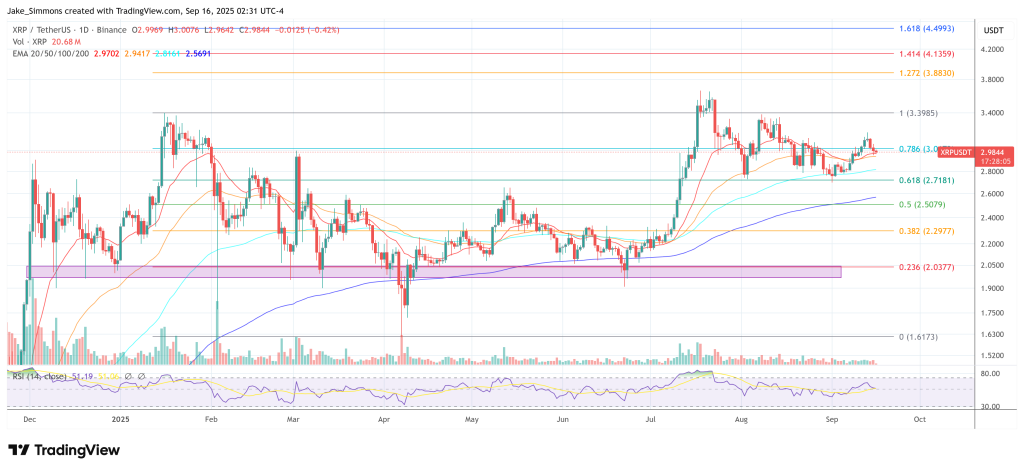Caitlin Long Drops Bombshell: Ripple’s Fed Master Account Hopes Dashed
Ripple just hit a regulatory wall—Caitlin Long predicts the Fed will slam the door on their master account application.
Why It Matters
No master account means Ripple stays locked out of the real-time payment system—a brutal setback for their banking ambitions. They’re stuck relying on traditional correspondent banks, adding friction and cost just when the crypto space is hungry for seamless settlements.
Long’s track record adds weight: she called the crypto banking crisis before it erupted. Now she’s signaling that regulators aren’t ready to blur the lines between crypto and traditional finance—no matter how much lobbying firepower you throw at them.
Behind the Scenes
The Fed’s hesitance isn’t new. They’ve been wary of granting master accounts to non-banks—especially ones tangled in legal fights with the SEC. Ripple’s ongoing lawsuit doesn’t help. It’s a classic case of regulatory chicken: innovate first, ask permission later… and sometimes get denied.
What’s Next?
Ripple’s back to square one—pushing partnerships and workarounds while the old-guard bankers smirk. Because nothing makes traditional finance happier than watching crypto “disruptors” learn that in the end, the Fed still holds the keys.
Can Ripple Get A Fed Masters Account?
The Fed’s legal and policy framework backs up the distinction Long describes. In August 2022, the Board finalized its Account Access Guidelines, which formalized a three-tier review system and made clear that Reserve Banks evaluate requests for access to “master accounts and services” against safety-and-soundness, legal eligibility, and systemic-risk criteria. The framework subjects non-insured, novel charters to the most stringent review.
Separately, the Federal Reserve defines a master account as “the record of financial rights and obligations” between an account holder and its Administrative Reserve Bank—precisely the ledger relationship that enables par settlement on Fed rails.
Courts have since affirmed broad Fed discretion to deny master-account requests even for legally eligible institutions, a precedent set in 2024 rulings that rejected arguments the Fed must grant access upon request. That judicial backdrop is central to Long’s claim that policy won’t bend for trust companies: “I have had very extensive conversations with the actual decision makers,” she said, and the line drawn around deposit-taking banks “is not going to change.”
Naming names clarifies where crypto stands today. The Federal Reserve’s public Master Account and Services Database—updated most recently with data current as of May 31, 2025—lists new “access requests” and their status, offering an official window into who is asking to join the payment system directly. A Congressional Research Service report, citing that database, notes that Kraken Financial and Protego Trust have pending applications, while Bankwyse, Commercium Financial (a Wyoming SPDI) and Paxos withdrew theirs; Custodia’s request was denied.
After that, Standard Custody & Trust (Ripple-owned) and WisdomTree Digital Trust have entered the crypto-adjacent access requests, underscoring the sector’s shift toward bank-grade plumbing even as eligibility questions remain for trust companies.
Long, for her part, emphasized the legal dividing line those lists reveal: “All these trust companies, including OCC trust companies, [are] not eligible to get access to the payment system for moving US dollar deposits… Getting access to Fedwire and ACH at the Fed, you’ve got to legally be a depository institution.”
Her argument turns on first principles rather than policy mood. “What is a depository institution? It is a financial institution that is legally authorized to accept a US dollar deposit,” Long explained. Because trust companies are “prohibited from accepting a US dollar deposit,” the Fed’s payment system remains a bank-only lane. The consequence, she said, is structural: “These trust companies… are intermediary stops. That’s great… [they] give companies the ability to do business nationwide” without fifty separate money-transmitter licenses. “But… not for moving money in the payment system.”
In Long’s telling, stablecoin-issuance will ultimately consolidate “entirely” inside banks—some of which may be crypto-founded but will nevertheless be banks—because only banks can tap the Fed’s par-clearing privilege at scale. For Ripple, the path forward therefore looks binary. The trust-company architecture around Ripple USD can support custody and fiduciary functions; it cannot, in Long’s reading and the Fed’s rule set, unlock direct Fedwire/ACH access on its own.
That explains Ripple’s pivot toward a national bank charter and a master-account application—steps that, even if they clear eligibility, must still pass the Fed’s risk-based scrutiny that tripped other applicants. In the meantime, Long’s bottom line hangs over every trust-charter strategy in crypto: “The value of moving money in the payment system? It’s the par guarantee.” And that, she insists, “won’t” be available to trust companies—Ripple included—unless they become banks.
At press time, XRP traded at $2.98.


